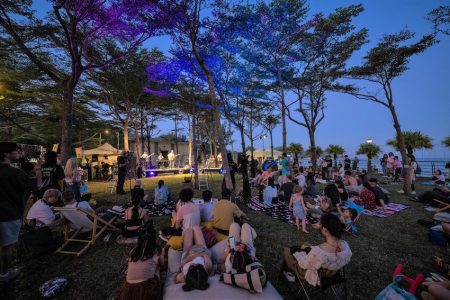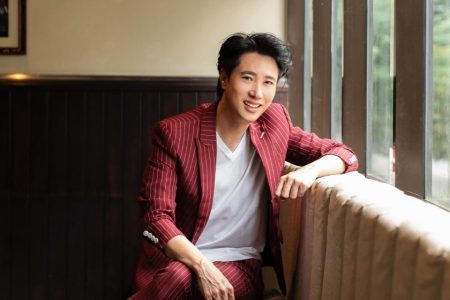At 36 years of age, Macanese vocalist Germano Guilherme (also known as German Ku) has established himself as one of the city’s most talented singers. He made this abundantly clear last month by earning the top prize in Midlife, Sing & Shine! 2, a nearly 9-month-long singing competition with 108 participants broadcast in Hong Kong by TVB.
During the finals, Guilherme gave renditions of two songs that helped to secure his win – “Heart is Still Cold” (心仍是冷) and “Feeling Good.” The former is a lugubrious ballad originally sung by Guilherme’s idol and Cantopop diva, Anita Mui, while the latter is an old show tune originally written for a 1964 British musical. It earned Guilherme 99 points from the judges.
The competition marked a significant milestone for Guilherme, who first tapped into his passion for singing as a young adult by performing at local events, as well as national ones, including the opening ceremony of the National Games in 2009.
[See more: Ari Calangi: Making his return to the stage]
That same year, he would gain prominence by participating in ATV’s Asian Millionstar competition. Although he didn’t manage to break into the top three, his talent was recognised with a stage presence award.
In the years since, Guilherme has continued to hone his craft, releasing a number of singles, EPs, as well as his first album Fai (輝) in 2020. He took time off from rehearsals to speak to Macao News.
This interview has been translated from its original Cantonese, and has been edited for brevity and clarity.
How important have competitions such as Asian Millionstar and Midlife, Sing & Shine! 2 been to you?
The significance is immense because these are long-term competitions. It’s not like the usual one-off competitions where those in first, second and third place are decided with one song.
[See more: 10 questions for Macao music group MFM]
With the [long-term] competitions, everyone can see your improvement and growth along the way. Also, the judges, coaches and internet users will constantly give you lots of suggestions, meaning you will constantly improve. At the same time, you will see a lot of your shortcomings. By improving on these, you will see considerable improvements in your music.
What do you think your strengths and weaknesses are as a singer?
For strengths, it would firstly be my many years of experience as a performer. If you’re talking about weaknesses, then I would also say I have too many years of experience.
When I go up on stage, I give off this aura that everything is practised and rehearsed. The good thing is that I’ve received a lot of help and advice from many people including Vivian Koo [Ku’s singing coach in Midlife, Sing & Shine! 2], who helped me to improve my singing tone a lot.
You have often cited Anita Mui as your idol. Tell us more.
I’ve liked Anita since I was little. I remember I was maybe two or three years of age. By chance, I happened to see this young lady wearing a fruit hat who was singing and dancing very happily and skillfully on TV.
[See more: In conversation with Marta Pereira da Costa, queen of the Portuguese guitar]
Later on, I found out that this young lady was called Anita Mui. From then on, I began to really admire her and she became my idol. I take example from her professionalism on stage and I think her professional mentality is worth learning, especially for the younger generation.
What about your mentor Maria Cordero?
I’ve learnt a lot from her. The most important lesson is to respect others, respect yourself, respect your work and, most importantly, respect the stage and your audience members.
What are the biggest differences between the Macao and Hong Kong music scenes?
Macao is a comparatively small place, so relatively speaking, many Macao-based singers and artists who are involved in performance and the arts may not have as many opportunities.
[See more: Meet Soler’s Giulio ‘Julio’ Acconci, actor, singer and painter]
The scope in Hong Kong is a little bigger, so there might be more pathways . It’s also easier to gain recognition from people, but fortunately, the Macao government is working hard to promote Macao culture and art. I hope that in the future, we can promote not only local singers, but also all aspects of the local culture.
What kind of music do you enjoy listening to?
I quite like listening to blues, blues rock, R&B and songs that are a little bit more musical or Broadway in style, like “Feeling Good.” If you’re talking about blues, then it would be “Georgia of My Mind” and “At Last.” I quite like these kinds of songs.
[See more: When souls connect: How handpans became a thing in Macao]
I hope I can find a platform to sing these songs for everyone to listen to because these are tunes that rely on feel. It might be that people don’t pay much attention to them in comparison to pop songs. So, I hope everyone can listen to these songs again because they are really great.
Have you thought about making the jump into movies?
The competition just finished and I haven’t sung for some time, so I want to concentrate on music for the time being. I’ll take it step by step. [But] the interest is definitely there.
You’ve participated in musical events to help promote patuá. Have you thought about releasing an album in the language?
If there is an opportunity, I would really like to because not only is this the culture of my ethnic group, but if I can use what little ability I have to make more people aware of our Macanese culture, then I would be more than happy to do my part.

What do you hope to do when you return to Macao?
I really like to eat, so after we are finished with this concert, I really want to meet up with some friends and family and eat some noodles, hotpot, Portuguese food and things that I wasn’t able to eat [in Hong Kong].
What advice would you give to young singers in Macao who want to make a name for themselves?
If you really like singing, then you have to work hard to perfect your singing skills. If you feel like you’re stuck in a rut, or think you’re more talented than everyone else, you’ll quickly find yourself falling behind the rest of the pack because a lot of the people around you are also working hard in doing the same things as you.
[See more: Macanese musician Gabriel strives to keep patuá alive with his new EP]
Most importantly, you have to find your own character. By that, I mean you have to understand yourself. You have to recognise the type of person you are and want to convey a message to your listeners through your music and work, which will allow them to know you and have an even better understanding of you.






